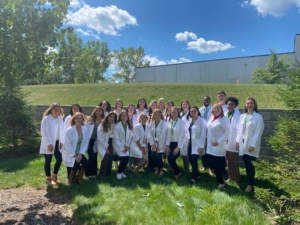Congratulations on your acceptance to a dietetic internship! The hard work and perseverance during your DPD program paid off and you are one step closer to becoming a registered dietitian. Although the start of your rotations may seem in the distance, you can take a few steps to ease any pre-internship jitters and ensure you are the most prepared dietetic intern come orientation.

Spring 2022 Cohort interns taking a group photo during BWS DI Orientation.
From knowing what to wear on your first day to mastering the Nutrition Focused Physical Exam, the Be Well Solutions Faculty Advisor team put together a few tips and tricks to help you prepare:
Be the best dressed intern
Transitioning to the workforce (or back into the workforce) can sometimes be a culture shock for some. If you need to complete a rotation on-site, real pants are required (sorry leggings and sweatpants). Avoid a wardrobe overhaul by checking in with your preceptor in advance to confirm the dress code for your rotation, or to understand if there are any special items needed such as a lab coat or nonslip shoes for a foodservice rotation.
Planning your rotation outfits will help you from scrambling the night before a new rotation, plus you will likely save money on expedited shipping from your favorite online store! Here are a few wardrobe items we always recommend having on hand:
- Dress pants
- Blouses or collared shirts
- Flats or business casual dress shoes
Our BWS DI swag shop offers a few different clothing options that may be appropriate to wear during your internship! You can check it out here.
Organization is important for internship success
Speaking from experience, your internship is going to fly by. You do not want to be the intern working on an assignment past 10 pm on a Tuesday because you lost track of the time. Your future self will not be thanking you when you’re on your third cup of coffee the next day and you have several nutrition intake assessments to complete plus an MNT presentation on a renal diet…
Before your internship begins, think about how you will stay organized so you can thrive and not just get by. Here is what we recommend:
- Use technology to your advantage! There are many free project management tools (Clickup.com, Monday.com, Google Sheets Template, etc.) you can use to manage projects, assignments, and due dates so you can manage your time efficiently and not lose track of a thing.
- Input reminders in your phone’s calendar for meetings or major project deadlines.
- If you’re old school and prefer a planner, use that too!
Staying organized is the #1 tip we recommend to our interns; establishing good organizational habits will help in your future career as well. This is why the BWS DI team gives all interns a syllabus of deadlines and important dates at the start of the internship to help interns with good time management.
Preparation is crucial for your clinical rotation
The dreaded clinical rotation… no matter if you aced your MNT class or not, most interns feel nervous leading up to their clinical rotation. Things just feel different when you go from completing a case study to working with a patient in a hospital or long-term care setting. So if you’re reading this now, take a deep breath and check out the following tips for mastering your clinical rotation:
- Brush up on drug and nutrient interactions that you may encounter during your clinical rotation. Tip: Reach out to your clinical preceptor to see if they have any suggested resources/tools to review prior to day 1.
- Prepare a list of questions to go through with your preceptor on day 1. Here are a few examples to get started:
- What is the preferred method of charting: ADIME or SOAP?
- When should notes be completed after meeting with a patient?
- How long do you usually spend with each patient?
- Review the NFPE Pocket Guide and practice on a friend or family member.
- If you want a quick reference guide, consider purchasing a pocket guide to clinical nutrition.
- Make a cheat sheet of formulas and equations.
- Buy a notebook and pens/pencils to take notes.
Did you know? BWS DI provides a two-day crash course on Enteral and Parenteral Nutrition during orientation to help interns succeed in their clinical rotations!
Tackle the pre-orientation checklist
Most internships provide a pre-orientation checklist of forms to fill out, tasks to complete, and policies and procedures to review. Use some of the organizational tips from above to practice staying organized and completing tasks on time. Also, utilize this time to ask questions and confirm any last-minute details so you can enter orientation feeling confident and ready!
Here are a few examples of what a BWS DI intern completes before orientation:
- Review the BWS DI Welcome Packet
- Read the Intern Handbook
- Complete your intern bio slide (we will provide a template for you to fill out)
- Set up your Prism account and review the Prism training guide
- Check out the tuition payment plan options, if needed
Create a personal checklist for yourself to address any appointments, errands, or items on your to-do list before orientation. Minimizing the number of other demands during your dietetic internship is a strategy that allows you to remain focused and minimize external stressors.
Plan for self-care during your internship
At Be Well Solutions, our mission is to “positively impact employees’ emotional and physical health.” Therefore, we believe the emotional and physical health of our employees and interns are equally as important. Remembering to prioritize yourself during your dietetic internship is crucial for a positive experience.
Before orientation, please take a moment to rest since the internship is going to be busy, and as part of that, make sure to prioritize your mental health and well-being by scheduling in time for the things you love! Cycling your thing? Make sure to find classes that fit your new schedule. Tip: Create a self-care budget for little splurges that will help you to keep going during your busiest weeks.
Don’t forget to tell friends and family so they can help support you and understand why you are busier than normal these next few months.
Just remember, every registered dietitian has been a dietetic intern. Your internship is an educational experience and an opportunity to practice your new nutrition and dietetics skills. By taking the appropriate steps listed above, you can optimize your experience and be able to look back on your dietetic internship as a positive step in your RD2Be journey.
Have a question? Check out our FAQs, leave a comment below, or send us an email at bwsdi@bewellsolutions.com!

